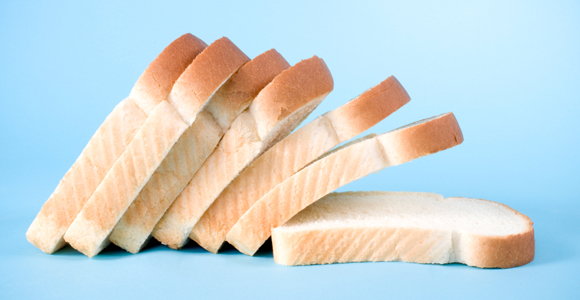If you're avoiding your beloved white bread for fear of harming your health, here's some tasty news: You can enjoy the fluffy stuff again without guilt, as long as you choose wisely. This means opting for sourdough bread over the standard Wonder variety--hardly a sacrifice, considering the zesty flavor and satisfyingly chewy crust of this tangy baked treat.
An Ancient Bread
Hardly a fad food, sourdough bread was developed thousands of years ago, possibly by Egyptians. The very first form of leavened bread, historians believe sourdough was discovered by accident--ancient bakers likely left wheat dough sitting out, and then wind blew wild yeast into the mixture, causing the dough to rise. Today, bakers make sourdough with flour, yeast and a bit of sugar, and allow the concoction to ferment for several days--it's the fermentation that gives sourdough its distinctive taste.
Why is Sourdough So Awesome for Your Health?
Let's start with the downsides of your average American white loaf. Most refined breads cause a quick spike in blood sugar, which leads to a temporary energy boost. Blood sugar promptly crashes, however, leaving you lethargic and causing food cravings. Plus, your body pumps out extra insulin to respond to the increased blood sugar, and people who eat a lot of processed carbs--white bread, for instance--may be more likely to develop diabetes, according to Harvard Medical School.
Although sourdough bread also contains processed carbs, it doesn't create the same spike-and-crash effect. In fact, Professor Terry Graham of the University of Guelph's Department of Human Health and Nutritional Sciences found that people who eat sourdough bread have even lower blood-sugar levels than those who eat bread partially made from whole wheat. Not only did he find that blood-sugar levels remain low just after eating sourdough bread, but they remain low for hours--even after consuming a second meal.
Apparently, fermenting the dough affects the bread's starches, eliminating some of the ill-health effects of refined grains. In addition, nutrients such as protein are broken down during the fermentation process, allowing your body to absorb them more easily.
If anecdotal evidence holds true, sourdough may hold even more health perks. Although clinical trials are needed to verify these claims, some sourdough proponents report that this special bread improves your mood and reduces your risk of disease.
And Sourdough Isn't Limited to Only Bread
You can use sourdough starter for biscuits, pancakes and even brownies (although sour desserts may be a bit of an acquired taste). Home bakers can easily begin their own sourdough starter, draw from it for recipes and then cultivate the rest in the refrigerator for years to come.
Can You Eat All the Sourdough You Want?
As with all foods, moderation is key with sourdough. You should still incorporate whole grains such as whole-rye bread, brown rice and quinoa into your diet for a broad range of nutrients. However, next time that white bread craving kicks in, a thick slice of sourdough just may be the best choice for your health.
Nina Kate is a certified fitness nutrition specialist through the National Academy of Sports Medicine (NASM). She also studied journalism at the University of California, Los Angeles (UCLA), and has contributed to numerous major publications as a freelance writer. Nina thrives on sharing nutrition and fitness knowledge to help readers lead healthy, active lives. Visit her wellness blog at BodyFlourish.com.




